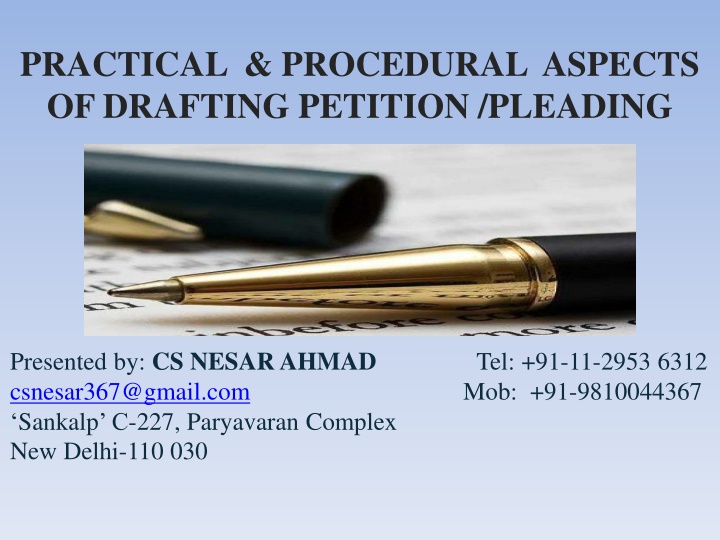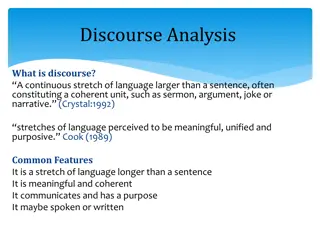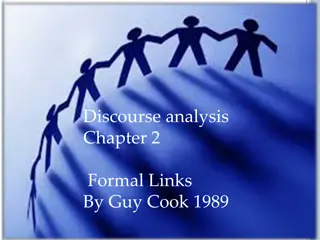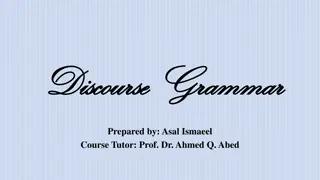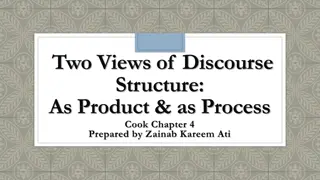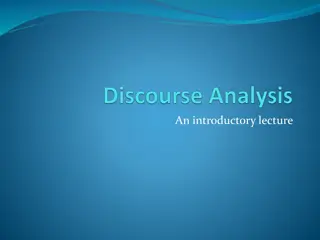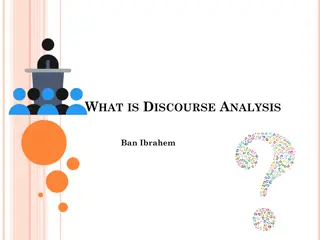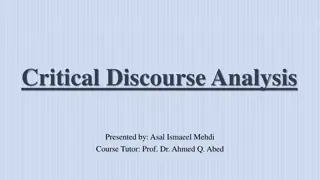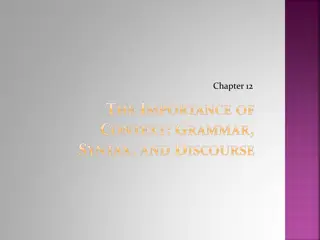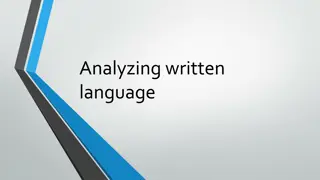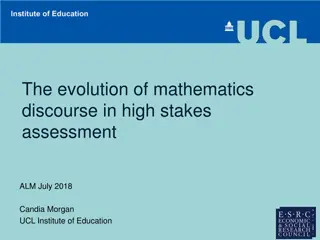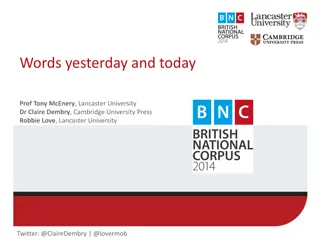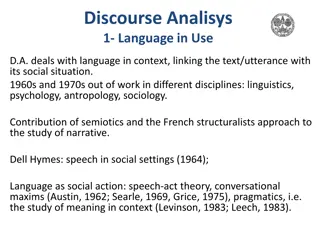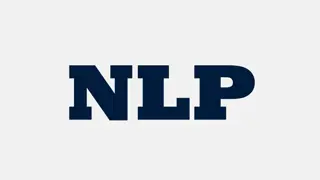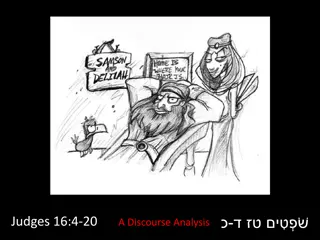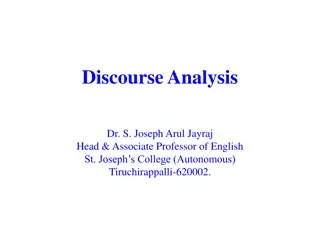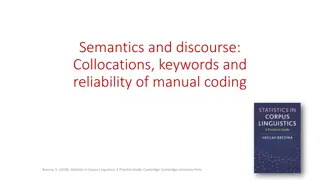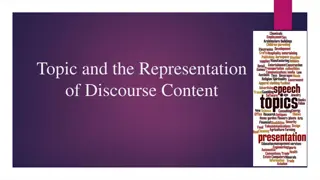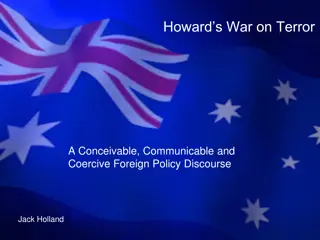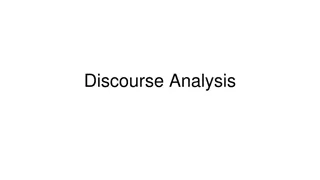Essentials of Discourse and Language Analysis
Discourse analysis delves into the communication and language realms, exploring social semiotic perspectives, semiotics, and examples like traffic lights and interpretation of colors. Language as a social semiotic is examined through conventions at various levels, from words to texts. The significance of texts in discourse analysis is highlighted, emphasizing their central role as meaningful semantic units within situational contexts. Additionally, cultural aspects, including genres, participants, and channels, are intricately linked to textual production and understanding.
Download Presentation

Please find below an Image/Link to download the presentation.
The content on the website is provided AS IS for your information and personal use only. It may not be sold, licensed, or shared on other websites without obtaining consent from the author.If you encounter any issues during the download, it is possible that the publisher has removed the file from their server.
You are allowed to download the files provided on this website for personal or commercial use, subject to the condition that they are used lawfully. All files are the property of their respective owners.
The content on the website is provided AS IS for your information and personal use only. It may not be sold, licensed, or shared on other websites without obtaining consent from the author.
E N D
Presentation Transcript
PRACTICAL & PROCEDURAL ASPECTS OF DRAFTING PETITION /PLEADING Presented by: CS NESAR AHMAD Tel: +91-11-2953 6312 csnesar367@gmail.com Sankalp C-227, Paryavaran Complex New Delhi-110 030 Mob: +91-9810044367
DRAFT NCLT RULES Document EDGAR Application Electronic Filing Petition
PLEADING BEFORE NCLT Must consider several potentially threshold issues before drafting. Must analyze-Actual case or Controversy. Focusing on jurisdiction over the subject matter.
PRACTICAL & PROCEDURAL ASPECTS OF PLEADING Synopsis/summary of the case. Narrow down the controversy between the parties. Dates, sums and numbers- in figures as well as in words. Pleading should contain material facts only. Pleading should not contain findings.
DRAFTING OF PLEADINGS Quote relevant provisions in the petition. Do not suppress facts. Highlights material facts, legal provisions and Court decisions, if any. State important points together with reference.
PREPARATORY POINTS Take minute fact from the client. Lend your complete ears to the client. Put question to the clients. Convey to the client about exact legal position. Give correct picture of judicial view.
WHILE PRESENTING THE CASE Submit a list of citations to the Tribunal. State brief facts. Formulate issues/points. Take each point and state relevant facts. Hand over the Xerox copies of binding decisions to the Court Master/opposite party.
PROFESSIONAL ETIQUETTES 1. Dressing Etiquettes Navy Blue suit and white shirt. Saree or any other dress of a sober colour with a Navy Blue jacket. 2. Handshake Etiquettes 3. Communication Etiquettes
CONDUCT AND ETIQUETTE DUTY TO THE TRIBUNAL - Conduct himself with dignity and self-respect. DUTY TO CLIENT - Don t withdraw from engagements once accepted, without sufficient cause. DUTY TO OPPONENT - Do his best to carry out promises made to the opposite-party.
TIME MANAGEMENT 1. Being busy isn t the same as being effective. 2. Spend more time on specific activities. 3. Use your free time wisely. 4. Attempt the assignment on priority basis.
OPPORTUNITY FOR COMPANY SECRETARY
OPPORTUNITY FOR CS Compromise andArrangement. Oppression & Mismanagement Revival & Rehabilitation of Sick Companies. Winding up ClassAction. Merger &Amalgamation Insolvency & Bankruptcy Law, etc.
OPPORTUNITY FOR CS Section 2(41) Financial Year Section 7 (7) Legal Action taken by NCLT for furnishing false or incorrect information Section 55 (3) Issue and redemption of preference shares.
OPPORTUNITY FOR CS Section 58(3)&(4) Appeal against the refusal of transfer. Section 59(1) Rectification of register of members. Section 62 (4) to (6) Further issue of share capital
OPPORTUNITY FOR CS Section 71 (9) to (11) Action/petition by Debenture trustee before NCLT Section 75 Damages for fraud in Acceptance of deposits Section 97 NCLT has the power to call for AGM. Section 98 NCLT has the power to call for meetings other than AGM.
OPPORTUNITY FOR CS Section 99 Punishment for failure to comply with NCLT Directions regarding Meetings. Section 119(4) NCLT to order an immediate inspection of the minute-books. Section 130 Re-opening of accounts (books of accounts or financial statements) on NCLT orders.
OPPORTUNITY FOR CS Section 131 Approval of NCLT required for voluntary revision of financial statements Section 140 (4)&(5) Disqualification of auditors. Section 169(4) Removal of Directors.
OPPORTUNITY FOR CS Section 213 Investigation into affairs of the Company Section 216(2) Investigation of ownership of company Section 218 Protection of employees during investigation
OPPORTUNITY FOR CS Section 221 NCLT to order freezing of assets of Company on inquiry and investigation Section 222 NCLT to impose restrictions upon securities Section 224(5) An application before the NCLT for appropriate orders with regard to Action against Company or Directors.
OPPORTUNITY FOR CS Sections 241&242 Application may be filed before NCLT against Prevention and Oppression and Mismanagement. Section 441 Compounding of offences by NCLT Many more
DRAFT RULES 1- National Company Law Tribunal Rules. 2- National Company Law Appellate Tribunal Rules. 3- Companies (Compromises, Arrangements and Amalgamations) Rules. 4- Companies (Prevention of Oppression and Mismanagement) Rules.
MYTHS Only lawyers can draft. I have been practicing as a Company Secretary for 10-20 years. It s difficult to venture into a new arena. Drafting is a burden. I have not studied the subject(s).
PRESENTATION SKILL Be prepared. Give yourself. Stay relaxed. Use natural humour. Plan your body positions. Pay attention to all details.
ETHICS & INTEGRITY Ethics +Integrity =Alignment (Inside & Out) Ethics: is an external system of rules and laws. Integrity: is an internal system of principles which guides our behaviour.
